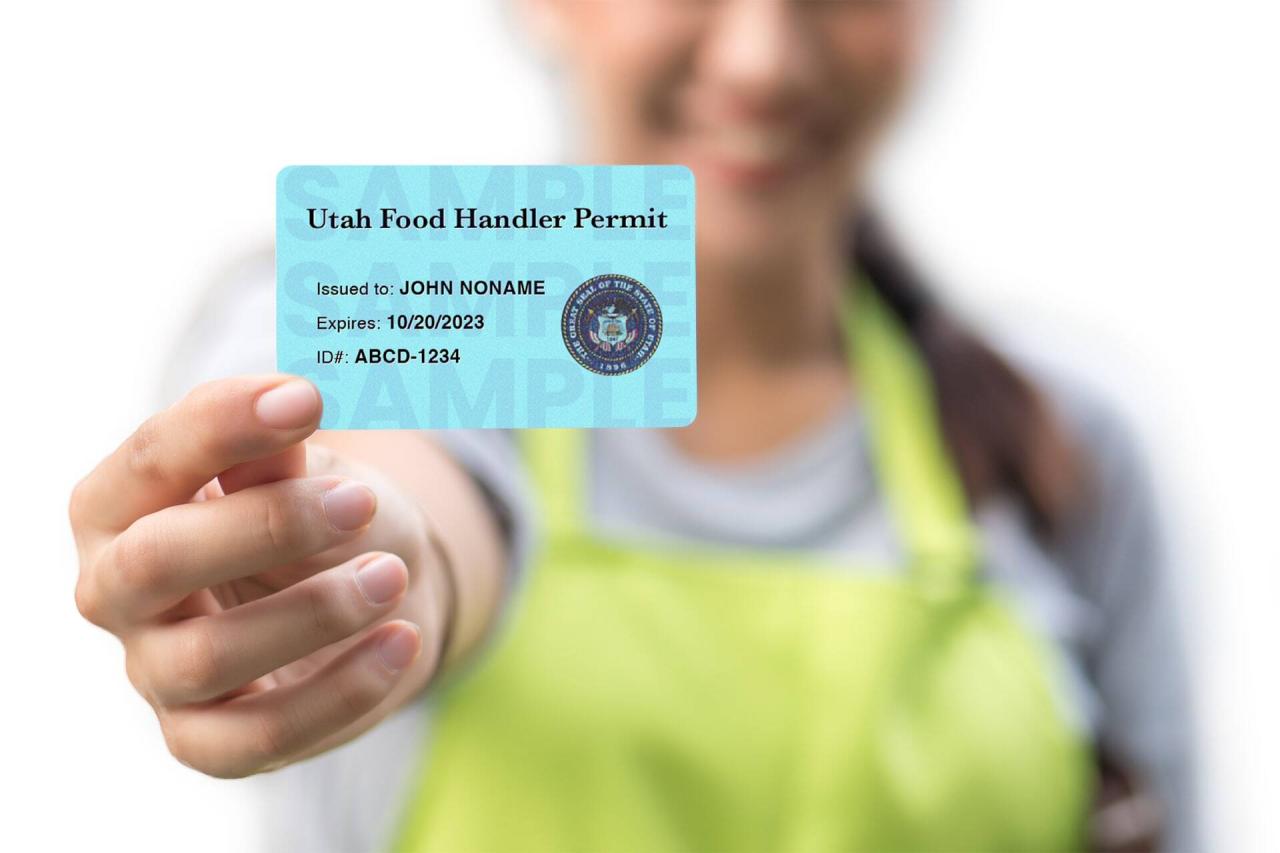Food handlers permit Utah answers: Your ultimate guide to safe food handling in Utah! This comprehensive resource provides all the essential information you need to obtain your permit, comply with regulations, and prevent foodborne illnesses. Stay informed and ensure the safety of your patrons with our expert insights.
Understanding the requirements, regulations, and best practices for food handling is crucial for maintaining public health and preventing foodborne illnesses. Our guide covers everything you need to know about obtaining a food handlers permit in Utah, ensuring compliance with food safety regulations, and implementing effective foodborne illness prevention measures.
Utah Food Handlers Permit Overview: Food Handlers Permit Utah Answers
The Utah Food Handlers Permit is a certification required for individuals who work in food establishments within the state. It ensures that food handlers have the knowledge and skills necessary to protect the public from foodborne illnesses.
All food handlers who work in establishments that prepare, serve, or sell food to the public are required to obtain a permit. This includes employees of restaurants, grocery stores, caterers, and other food-related businesses.
Process for Obtaining a Permit, Food handlers permit utah answers
To obtain a Utah Food Handlers Permit, individuals must complete a food safety training course and pass an exam. The training course can be taken online or in person. The exam is administered by the Utah Department of Health.
The cost of the permit varies depending on the training provider. The exam fee is $10. Permits are valid for two years and must be renewed before they expire.
Food Safety Regulations and Compliance
Food handlers in Utah must adhere to a set of regulations established by the Utah Department of Agriculture and Food (UDAF) to ensure the safety of food served to the public. These regulations cover various aspects of food handling, from storage and preparation to serving and disposal.
Compliance with these regulations is crucial to prevent foodborne illnesses and protect the health of consumers. Food handlers who fail to comply may face penalties, including fines and license suspensions.
Common Food Safety Violations
Common food safety violations observed by health inspectors include:
- Improper food storage temperatures
- Cross-contamination between raw and cooked foods
- Insufficient handwashing
- Use of contaminated equipment or utensils
- Lack of employee training on food safety practices
These violations can lead to foodborne illnesses, such as Salmonella, E. coli, and Listeria, which can cause serious health problems for consumers.
Foodborne Illness Prevention

Foodborne illnesses are a major public health concern, affecting millions of people each year. These illnesses can range from mild to severe, and can even be fatal. Food handlers play a critical role in preventing foodborne illnesses by following proper food handling practices.
There are many different types of foodborne illnesses, each caused by a different type of bacteria, virus, or parasite. Some of the most common types of foodborne illnesses include:
- Salmonella
- E. coli
- Listeria
- Campylobacter
- Norovirus
Foodborne illnesses can be prevented by following proper food handling practices. These practices include:
- Washing hands thoroughly with soap and water before handling food.
- Cleaning and sanitizing food contact surfaces.
- Cooking food to the proper temperature.
- Storing food at the proper temperature.
- Avoiding cross-contamination of food.
By following these simple steps, food handlers can help prevent foodborne illnesses and protect the public health.
Consequences of Non-Compliance
Ignoring food safety regulations can lead to severe repercussions for food establishments. Non-compliance puts consumers at risk and can result in fines, penalties, and license suspensions.
Beyond legal consequences, non-compliance can tarnish a food establishment’s reputation and drive away customers. Negative publicity and online reviews can damage a business’s image and erode trust among patrons.
Real-World Consequences
- In 2023, a popular restaurant chain was fined $150,000 after a foodborne illness outbreak traced back to their establishment. The outbreak resulted in multiple hospitalizations and one fatality.
- A local bakery lost its license after repeated violations of food safety regulations, including improper food storage and unsanitary conditions. The closure resulted in significant financial losses and job layoffs.
- A food truck was shut down indefinitely after failing to maintain proper temperature control, leading to a food poisoning incident. The incident damaged the truck’s reputation and caused a loss of income for the owner.
General Inquiries
Do all food handlers in Utah need a permit?
Yes, all individuals who handle food in Utah, including preparing, serving, or storing food, require a valid food handlers permit.
What are the penalties for non-compliance with food safety regulations in Utah?
Violations of food safety regulations can result in fines, license suspensions, and even criminal charges. The severity of the penalties depends on the nature and severity of the violation.
What are the most common foodborne illnesses?
Common foodborne illnesses include Salmonella, E. coli, and norovirus. These illnesses can cause symptoms such as nausea, vomiting, diarrhea, and abdominal pain.
